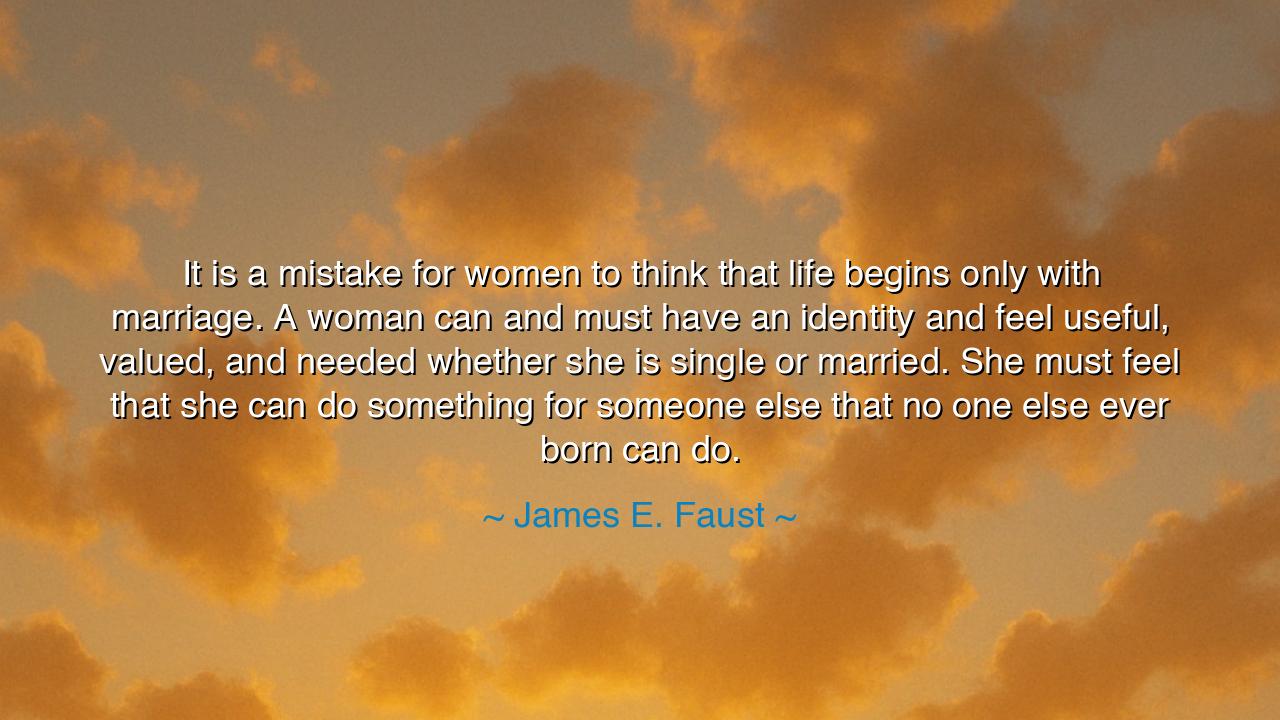
It is a mistake for women to think that life begins only with
It is a mistake for women to think that life begins only with marriage. A woman can and must have an identity and feel useful, valued, and needed whether she is single or married. She must feel that she can do something for someone else that no one else ever born can do.






In the words of James E. Faust, a man of quiet conviction and deep moral clarity: “It is a mistake for women to think that life begins only with marriage. A woman can and must have an identity and feel useful, valued, and needed whether she is single or married. She must feel that she can do something for someone else that no one else ever born can do.” These words flow like living water, both tender and resolute, a reminder that the sacred purpose of womanhood—and indeed of humanity—does not rest upon titles or bonds, but upon the flame of individual worth that burns within every soul.
In ages past, and still in some corners of the earth, the world taught women that their value began only when joined to a man’s destiny. They were told that life’s meaning began with marriage, that their purpose bloomed only when called “wife” or “mother.” Yet Faust, in his wisdom, saw that this belief was but a shadow—a narrow vessel for a limitless spirit. He spoke against it, declaring that a woman’s worth is not borrowed from another’s name, but rooted in her own divine identity, which exists before and beyond every bond of flesh.
Consider the story of Florence Nightingale, the “Lady with the Lamp.” She refused the call to marry, though many suitors came, for she felt her life’s purpose lay elsewhere—in the care of the suffering and forgotten. Against the ridicule of her age, she went to the battlefields of Crimea and turned the chaos of war into a sanctuary of mercy. Her lamp became a symbol not just of healing, but of self-determined purpose. She proved that one woman, standing in her truth, can bring more light than armies of convention ever could. Her service was not an act of rebellion against marriage, but a declaration that one’s calling transcends condition.
Faust’s words remind us that life’s value is measured not by the ring upon a finger, but by the light one gives to the world. To live as though marriage is the beginning of life is to forget that the heart beats long before it ever loves another. The woman who writes, who teaches, who serves, who dreams—she, too, fulfills the divine design. She may walk her path alone or beside another, but in either case, her purpose remains eternal and unshaken. Identity is not given—it is discovered, cultivated, and claimed.
Yet his message is not prideful, nor does it dismiss the sanctity of marriage. He speaks instead of balance and truth—that love shared between two souls should never erase the self, but rather exalt it. Marriage, in its truest form, is the union of two whole beings who have already learned to stand in their strength. When a woman enters marriage with her purpose intact, she becomes not a shadow, but a light that strengthens the bond. The man who walks beside her walks in the glow of a soul that knows its worth.
From this teaching arises a lesson for all generations: Do not wait for life to begin. Do not wait for permission to matter. Each woman—and each man—has a work upon this earth that only they can do. There are hearts that only your voice can comfort, needs that only your hands can fill, dreams that only your courage can bring to life. No one else ever born can do what you were meant to do. This is not pride—it is sacred responsibility.
Therefore, daughters of tomorrow, lift your eyes and live fully in every season of your being. If you are single, live with purpose; if you are wed, live with selfhood; if you are weary, live with faith. Seek not to begin your life with someone else—begin it with yourself. Cultivate your gifts, serve others, create beauty, build peace. For in doing so, you will find that the truest union is not only between two hearts, but between the soul and its purpose.
And thus we learn: Life does not begin with marriage—it begins when the soul awakens to its calling. Be useful, be kind, be brave. And wherever you walk, let the world say, “Here goes one who has found her reason for being.”






AAdministratorAdministrator
Welcome, honored guests. Please leave a comment, we will respond soon